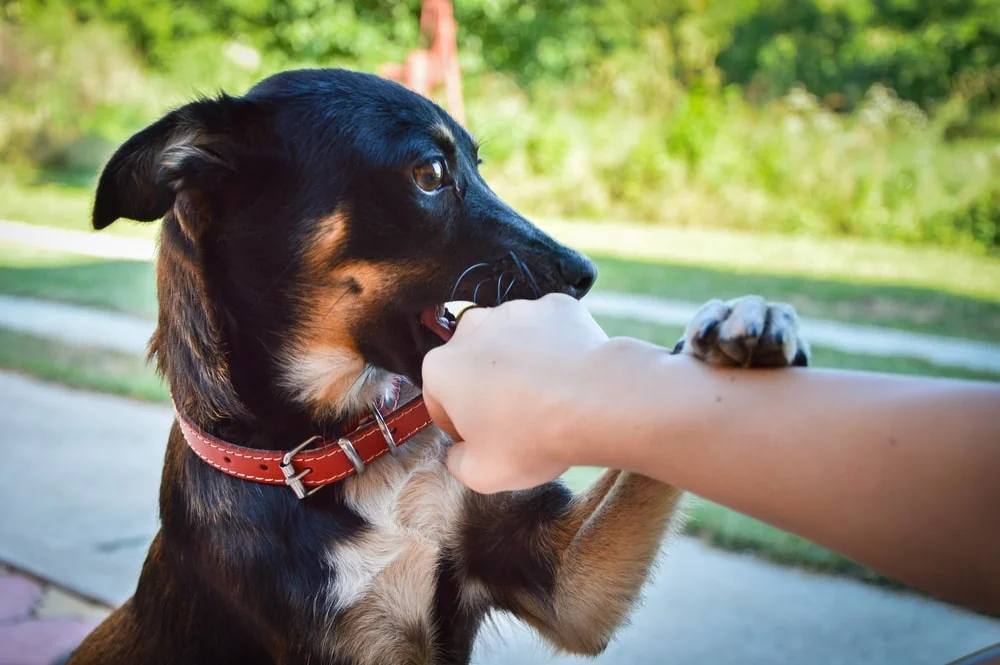PET BEHAVIOR
The truth is, no matter how friendly and loving your dog is, all dogs are capable of biting. Puppy biting is often overlooked as “playful,” “mouthy,” or “cute” while a dog is still young. However, even puppy bites can become annoying, painful, and dangerous if not controlled early on.
While it is normal for teething puppies to use their jaws and teeth to explore the world around them, this is a behavior you want to get under control before your pup grows up. Adult dogs who bite can be labeled dangerous, resulting in costly lawsuits, expensive homeowner’s insurance premiums, and possibly worse.1
What is Bite Inhibition?
In dog training, the term “bite inhibition” refers to a dog’s ability to control the pressure of its mouth on people and other dogs. This is something that young puppies naturally learn by playing with other dogs.
A group of puppies can play by wrestling, jumping, pouncing, biting, and mouthing. When one dog accidentally bites another too hard, the pup receiving the bite will yelp in pain and step back from playing. The biter, surprised by the yelp, will also pause for a moment before playing resumes. These interactions teach dogs to control the intensity and pressure of their biting.
According to the American Society for Prevention of Cruelty to Animals (ASPCA), some dog trainers believe a dog who has learned to use his mouth gently is less likely to bite hard out of fear or pain.2
Even if your dog never bites you out of anger or fear, if they never learn good bite inhibition, you will probably feel their jaws as they take a treat or toy from your hands. Remember, their jaws only become more powerful as they grow.
Teaching your Puppy not to Bite
Do you want to teach your puppy that biting is not acceptable? You can start by allowing your puppy to mouth you while playing. When the mouthing becomes too hard or turns to a bite, give a high-pitched “ouch!” You will be imitating the sound that littermates or the mother would make if the bite became too hard during play or nursing.3 This sound will resonate with your pup, and teach them how hard is too hard when it comes to mouth play.
Teaching your Dog Not to Bite? Avoid Disciplining the Wrong Thing.
Why is your dog biting? Some reason include to communicate displeasure, fear, pain, and frustration.4 Bites may also comes as a result of a dog feeling nervous or anxious.
Some people will try to teach their puppies not to growl or snap, thinking this is part of training a dog not to bite. You never want to punish your puppy (or dog) for displaying natural warning signals. What a dog is trying to communicate through a growl, snarl, or snap could be heard as: “back up! Leave me alone. I am feeling uncomfortable!” No dog wants to bite. Likewise, dogs seldom bite out of nowhere. Often, many simply fail to pick up on the warning signals. Biting can be a last resort for a dog who feels threatened.
If you punish your dog for his or her innate communication signals, he or she may learn it is not safe to let you know when he feels threatened. Suppressing this can increase the chances of a dog biting without warning.4
Reward Your Dog for Not Biting
Instead of punishment, try rewarding the dog for desirable behavior. When playing with your puppy, the moment you feel his teeth come down too hard on your skin, try the high-pitched, “Ouch!” If the dog backs off, immediately reward your dog with a treat and plenty of verbal praise.5 Your dog is likely to repeat behaviors that earn him/her a treat, so be sure to only want to reward the behavior you want them to continue.
If your Dog Bites, Try the Cold Shoulder
What your dog wants more than anything is your attention. Therefore, even negative attention is better than no attention at all. Teach your dog that when mouthing gets too rough, all playing ends. Tuck your hands behind your back or under your arms and turn your back. If necessary, you can also put the dog in its crate for a brief “time out” and walk away for a few minutes until her or she calms down.
Other Ways to Stop your Dog From Biting
- Get an appropriate puppy chew item: It’s a good idea to have a few different chew toys on hand whenever you are playing. This way, as soon as your pup goes for your fingers or shoes, you can substitute the toy. You will help teach the puppy which items are okay to chew on and which are not.
- Take the dog for several walks a day or let him run in a supervised, fenced-in yard. If you find you are substituting toy after toy and none of them interests your dog, they may need to burn off some extra energy. Try taking your dog for a walk and see if that tires them out. If you have an escape-proof yard, take the dog outside and let them run off the excess excitement.
Use Positive Reinforcement
Don’t forget to use positive reinforcement to encourage good behaviors - even when you have not explicitly asked your dog to do them.6 If you happen to walk by your dog’s crate and see the puppy lying quietly, reward the pup with a treat and a “good boy!” With enough consistency, he or she will learn that this behavior pleases you.
Teaching your dog to control their biting is crucial - both for your dog and the safety of others.
Consider Investing in Dog Insurance
Looking for more ways to keep your pup happy and healthy? Consider investing in a dog insurance policy with MetLife Pet Insurance.1 Our dog insurance policies can provide the coverage and care your furry family member deserves. Get your free quote today.

